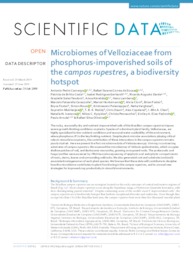Microbiomes of Velloziaceae from phosphorus-impoverished soils of the campos rupestres, a biodiversity hotspot.
Microbiomes of Velloziaceae from phosphorus-impoverished soils of the campos rupestres, a biodiversity hotspot.
Author(s): CAMARGO, A. P.; SOUZA, R. S. C. de; COSTA, P. de B.; GERHARDT, I. R.; DANTE, R. A.; TEODORO, G. S.; ABRAHÃO, A.; LAMBERS, H.; CARAZZOLLE, M. F.; HUNTEMANN, M.; CLUM, A.; FOSTER, B.; FOSTER, B.; ROUX, S.; PALANIAPPAN, K.; VARGHESE, N.; MUKHERJEE, S.; REDDY, T. B. K.; DAUM, C.; COPELAND, A.; CHENM U, M. A.; IVANOVA, N. N.; KYRPIDES, N. C.; PENNACCHIO, C.; ELOE-FADROSH, E. A.; ARRUDA, P.; OLIVEIRA, R. S.
Summary: The rocky, seasonally-dry and nutrient-impoverished soils of the Brazilian campos rupestres impose severe growth-limiting conditions on plants. Species of a dominant plant family, Velloziaceae, are highly specialized to low-nutrient conditions and seasonal water availability of this environment, where phosphorus (P) is the key limiting nutrient. Despite plant-microbe associations playing critical roles in stressful ecosystems, the contribution of these interactions in the campos rupestres remains poorly studied. Here we present the first microbiome data of Velloziaceae spp. thriving in contrasting substrates of campos rupestres. We assessed the microbiomes of Vellozia epidendroides, which occupies shallow patches of soil, and Barbacenia macrantha, growing on exposed rocks. The prokaryotic and fungal profiles were assessed by rRNA barcode sequencing of epiphytic and endophytic compartments of roots, stems, leaves and surrounding soil/rocks. We also generated root and substrate (rock/soil)-associated metagenomes of each plant species. We foresee that these data will contribute to decipher how the microbiome contributes to plant functioning in the campos rupestres, and to unravel new strategies for improved crop productivity in stressful environments.
Publication year: 2019
Types of publication: Journal article
Observation
Some of Embrapa's publications are published as ePub files. To read them, use or download one of the following free software options to your computer or mobile device. Android: Google Play Books; IOS: iBooks; Windows and Linux: Calibre.
Access other publications
Access the Agricultural Research Database (BDPA) to consult Embrapa's full library collection and records.
Visit Embrapa Bookstore to purchase books and other publications sold by Embrapa.

